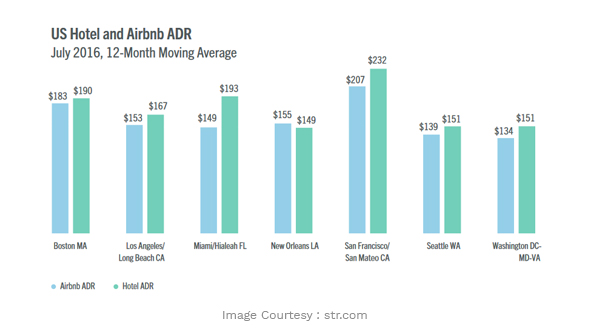How Are Vacation Rentals Affecting The Traditional Hospitality Industry?
- 17th Jul 2020
- 2476
- 0

Vacation rentals have become an essential choice for contemporary travellers in the last 20 years. The number of rental units went from 3000 in 2009 to almost 2.4 million in 2017 in the USA alone. The trend is the same when it comes to the rest of the world. So, the question is what happened? How something did came out of nowhere and started putting a dent in the hotel business that has been standing tall for at least more than 7 decades.

The answer to the question lies in the fact that sharing economies like Uber and Airbnb normalized the peer to peer sharing of resources that penetrated the property market. The success story of Airbnb and many others like Homestays and booking.com helped to establish the foundation on which vacation rentals as we know now were built. Traditionally homeowners were very sceptical about sharing their property with strangers and it was the same fear on the customer end to which the brand of a hotel provided the solution and trust necessary to allure customers. But with technologically enabled booking and payment processes, these fear went out of the window and hence people were ready to ditch the hotels based on many factors that made them feel at home which the hotel wasn’t able to provide.
There are many reasons for the success of vacation rentals and luxury vacation rentals which can be attributed partially to change in technology and partially behavior of the contemporary consumer. Here are a few insights:
Blurring lines between business and leisure.
It is not an alien idea that in this new generation that includes smart working, tech start-ups and avocado toasts the lines between professionalism and leisure are blurred. The millennial generation is not as strict in the dress code, working hours, and prefers to enjoy travel and leisure rather than opting for a stable household lifestyle. The advent of this culture enabled travellers to seek a home far from home. Many digital nomads work from very exotic locations and hence the strict lines between business and pleasure are blurred. The contemporary consumer demands authenticity, a taste of local food, embrace the tradition, and have a homely rustic environment when on holidays. Vacation rentals provide the perfect solution to this problem. The idea of having privacy and personal space with all the amenities makes vacation rentals more attractive than their traditional counterparts. One other thing that vacation rentals are very good at is providing accommodation for groups that can be leisure-related or business-related.

Internet and technology as an enabler of change.

The development of smartphones and internet technology and its expansion all over the globe in the last 20 years have enabled people to search and find homes in the location which were very alien and foreign before. Someone living in Dubai can easily find a rental on the Island of Greece and spend a 5 day holiday there without a lot of trouble. Most of the information is available online and the rest is provided and helped by people who manage the property. The payment is made before and hence the stress of having an extra bill is limited while you are enjoying your holiday which is opposite to that of a hotel where payments are made in the end. There is a level of psychological comfort that comes when major responsibility for the trip i.e. payment is made in advance and the only thing left is to enjoy the holiday. Also, technology helps to solve a lot of friction and interaction between the customer and the service provider. The traditional hotel industry needs to invest in the front desk to provide the best service, this adds to a lot of costs that the vacation rental industry does not incur. In the luxury vacation rental sector with concierge, this benefit on costs is absent.
Slow expansion and stagnation of the hotel industry.

As it is said any industry that has ruled and stayed in business for too long without making significant changes faces the challenge of stagnation and loss of innovation. The customer had no other option but to book the hotels and accommodations that give a certain level of service. One other limitation of the hotel industry comes from the fact that service providers also own the asset. As it is known to buy, building, and managing more assets as an individual brand is difficult and cannot be rapid. It takes years of investment and planning to add units/capacity in the hotel industry while the rental industry profits from making partners instead of owing the asset. According to the STR report published in 2017 analyzed data of the most successful vacation rental platform, Airbnb, from 13 countries over three years and revealed that available units for the said vacation rental increased by up to 100% in some cases. According to the STR report, 2 out of the 13 countries studied witnessed a decrease in hotel demand corresponding to an increase in that of vacation rental services. Besides, hotel rates in NYC witnessed a drop of 1.7% in 2015. The inability of the hotel industry to tailor-make solutions to the modern consumer is one of the reasons for the drop in market share. It is also, to be noted that vacation rentals are beefing up on their concierge services and professionalism which then makes these rentals especially in the luxury sector more appealing.
Hotels don’t market their USPs well enough.
It is important to understand the reasons for customers to choose one option or the other or both. One thing that happened is that vacation rentals are especially demanding during the weekend and mostly for leisure activities. Hotels still hold a strong footing in business-related customers. But everyone in the industry knows that leisure-oriented visits make a bigger buck than the business guests. There are different reasons why people choose one kind of accommodation or the other. The deciding factor for choosing a vacation rental is space, uniqueness of the property, authentic and local experience that surprises the customer. While for hotels the deciding factors are price, location, and amenities. Hotels have an upper hand when providing the best value on services. But often they are not marketed and communicated well. One of the findings from the 2019 Hotel Data conference was that more a guest is communicated about the facilities and more they use it the better the customer satisfaction. This way the customers find the value for money and hence have a natural appreciation for the services provided.
Data-driven marketing and targeting.
As discussed before the vacation rental industry relies heavily on data collection and targeting the right customer. They are also able to map the customer journey from just a lead to a full booking which is then finished with customer rating. These companies have extensive information on their target customers and the constant feedback helps them tailor the offer according to the customer. The rental companies can identify interested parties market them with an exact offer and surgically spend resources that make them a sale. They are also able to provide travel information and suggestion about the area beforehand that increases the comfort of the customers. While on the other hand most hotels rely their performance and feedback on annual reports and even in their competitive analysis they only include the hospitality industry but not the rental industry and that’s where the gaps are to be found. The extensive feedback mechanism and surgical marketing help the rental industry go ahead faster.
Transparency from booking to customer review.
In the internet-enabled age transparency is something that is valued and it becomes an important deciding factor. The way the whole process of booking is organized in vacation rental space generates a level of transparency regarding the services and extra charges. It is more objective and hence more transparent. But when it comes to hotels there are many times that communication of amenities is not as effective. It is partially because in the hotel industry its people dealing with people and sometimes quality of service offered might dwindle while in the rental space it’s all mechanical, online, and data-driven.
Recovering the lost market share
But all is not bleak for the hotel industry, it would be unfair not to recognize some major changes that are being made in hotel industries to strive through the competition that vacation rental has posed for last few years. There are some examples and suggestions that have helped to gain back some market share and provide good competition for the rental industry.

One thing that has happened is that hotels have partnered with giants like Airbnb, booking.com, and homestays to have their rooms listed on these websites. This in turn puts vacation rentals in direct competition from a player that is more technologically advanced and sophisticated. So all these rental companies are trying to get more hotels on-board which is like a win-win solution for both the parties.
Second, is an example of the Marriott group that took the opportunity to turn the tables around and partner with vacation rental companies. Most hotel industries find it difficult to integrate vacation rentals in their portfolio but Marriott leveraged its partnerships and came up with a pilot project in London. The pilot ultimately proved successful, with Marriott officially launching its home-sharing initiative just a year later. Several vacation rental property management companies, such as TurnKey Vacation Rentals, LaCure, and Veeve, have been named as partners in Marriott’s expansion into home-sharing.
Third, many hotels are now advertising their amenities and services on their website explicitly which entices a customer to look into it and generate a lot of leads. Many hotels are redesigning their rooms to resemble a more earthy and homely feeling. Also, some hotels are installing kitchens in the rooms and enabling people to have freedom of movement around and use all the amenities which is a great step forward.
Healthy competition ensures best innovation
All in all, it can be said the competition in the market is acute and hotels are having a hard time coping up with the trend. But it is not to say that it will disappear or become irrelevant. With increased advertising to its business customer segment, providing a homely and high level of service can work in the hotel industry’s favor. Partnership models similar to Marriott can also help establish these luxury high-class service providers to tap into a different customer segment. It is also to note that more people are traveling and booking accommodations than 10 years ago so in absolute terms there is an assured growth especially in the luxury segment for both the hotels and rentals. Careful cooperation and healthy competition will ensure the best results for the service providers and the customers alike.
 Rahul Parmar
Rahul Parmar


Comments
No comments yet.
Add Your Comment
Thank you, for commenting !!
Your comment is under moderation...
Keep reading luxury post